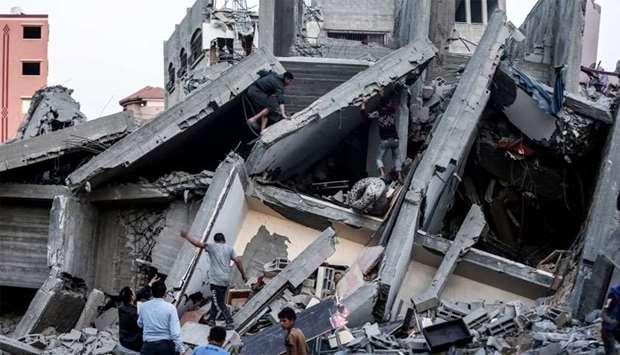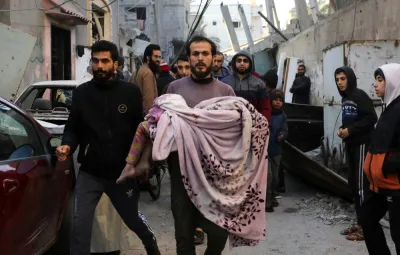Rockets and missiles from Gaza killed four civilians in Israel while Israeli strikes killed 14 Palestinians, most of them militants, in surging cross-border fighting on Sunday, according to Gazan officials and the Israeli military.
Israeli Prime Minister Benjamin Netanyahu said he ordered the military to continue "massive strikes" against Gaza's ruling Hamas group and Islamic Jihad in the most serious border clashes since a spate of fighting in November.
Israel's military said that more than 600 rockets and other projectiles - over 150 of them intercepted by its Iron Dome anti-missile system - have been fired at southern Israeli cities and villages since Friday.
It said it attacked more than 260 targets belonging to Gaza militant groups. Gaza officials said Israeli air strikes and artillery fire killed 22 people, including 10 civilians, since Friday.
A rocket that hit a house in Ashkelon on Sunday killed a 58-year-old man, police said. He was the first such Israeli civilian fatality since the seven-week Gaza war in 2014.
Another rocket strike killed a factory worker, a hospital official said. The military said a civilian was killed near the border by an anti-tank missile fired at his car from Gaza and a fourth died when a rocket struck the city of Ashdod.
In Gaza, Islamic Jihad identified seven fighters killed in Israeli strikes, while medical officials said that six civilians also died.
In what it said was a separate, targeted attack, Israel's military killed Hamed Ahmed al-Khodary, a Hamas commander. Hamas confirmed Khodary had been killed.
The attack on his car was the first such killing by Israel of a top militant since the war five years ago. Israel had suspended what Palestinians call an assassination policy in an attempt to lower tensions.
The sounds of sirens and explosions reverberated on both sides of the frontier, fraying nerves and keeping schools closed.
Israel halted supplies from its main natural gas field. The Tamar field's offshore production platform is in range of Palestinian rockets. Israel also stopped fuel imports into Gaza through the main Kerem Shalom crossing.
The latest round of violence began two days ago when an Islamic Jihad sniper fired at Israeli troops, wounding two soldiers, according to the Israeli military.
Islamic Jihad accused Israel of delaying implementation of previous understandings brokered by Egypt in an effort to end violence and ease blockaded Gaza's economic hardship.
This time, Israeli strategic affairs analysts said, both Islamic Jihad and Hamas militants appeared to believe they had some leverage to press for concessions from Israel, where independence day celebrations begin on Wednesday.
In two weeks Israel is also hosting the Eurovision Song Contest in Tel Aviv, the target of a Gaza rocket attack in March. That attack caused no damage. On Sunday sirens sounded in the city of Rehovot, 17km southeast of Tel Aviv.
Netanyahu, who doubles as defence minister, convened his security cabinet, which issued a statement saying it had ordered the military "to continue its strikes and to prepare for the next stages".


